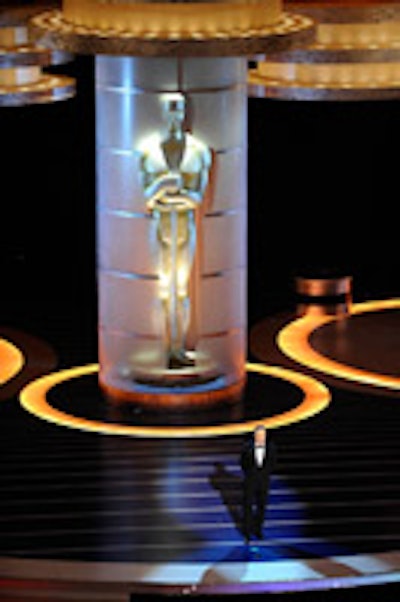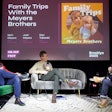
Jon Stewart on stage at the Kodak Theatre
Photo: Michael Caulfield/WireImage
The 80th annual Academy Awards—the ceremony that many feared might not materialize on account of the now-ended writers strike—indeed proceeded last night at the Kodak Theatre, in star-filled, picket-free grandeur. And although staffers spent the days leading up to the awards diligently protecting the arrivals area on Hollywood Boulevard against persistent rain, the dreary day in Los Angeles belied the relief of organizers, including Oscar broadcast producer Gil Cates, who had said emphatically that the academy would put on its show regardless of any effects of a writers strike (but who was no doubt showing his best poker face as he said it).
Louis Horvitz directed the show, and playing host again was Jon Stewart, who earlier this month pulled out of hosting duties for a big New York fund-raiser, citing the strike as the reason. In his opening monologue, Stewart quipped about the cancellation of Vanity Fair's party (which the mag axed nominally in solidarity with the striking writers), suggesting that Vanity Fair might just invite the writers to the party as a show of solidarity instead. Stewart also called attention to the montage-heavy telecast, saying, "Had the writers strike continued, they would have had to pad the show with even more montages." (Organizers had a significantly abbreviated time to prepare the script.)While the much-awarded Coen brothers seemed to run out of things to say in their acceptance speeches for No Country for Old Men, Bill Conti, the conductor of the 61-piece Oscar orchestra, was the man cueing the musical swells that indicated when others winners' 45 seconds of speech time were up. (The high-stress job wasn't easy: Cates called Conti "a warrior" in The Los Angeles Times for his ability to execute Cates's ruthless orders to "kill 'em.")
Streets surrounding the theater had seen closures as far back as 21 days before the show to aid organizers in their preparations. In the final analysis, the Oscars went off with all of the fanfare typical of any non-strike year. Somewhere, the Golden Globes are jealous.
Louis Horvitz directed the show, and playing host again was Jon Stewart, who earlier this month pulled out of hosting duties for a big New York fund-raiser, citing the strike as the reason. In his opening monologue, Stewart quipped about the cancellation of Vanity Fair's party (which the mag axed nominally in solidarity with the striking writers), suggesting that Vanity Fair might just invite the writers to the party as a show of solidarity instead. Stewart also called attention to the montage-heavy telecast, saying, "Had the writers strike continued, they would have had to pad the show with even more montages." (Organizers had a significantly abbreviated time to prepare the script.)While the much-awarded Coen brothers seemed to run out of things to say in their acceptance speeches for No Country for Old Men, Bill Conti, the conductor of the 61-piece Oscar orchestra, was the man cueing the musical swells that indicated when others winners' 45 seconds of speech time were up. (The high-stress job wasn't easy: Cates called Conti "a warrior" in The Los Angeles Times for his ability to execute Cates's ruthless orders to "kill 'em.")
Streets surrounding the theater had seen closures as far back as 21 days before the show to aid organizers in their preparations. In the final analysis, the Oscars went off with all of the fanfare typical of any non-strike year. Somewhere, the Golden Globes are jealous.



















